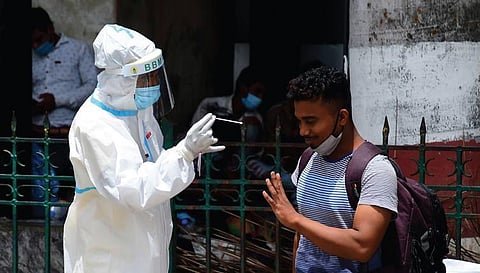

During the second wave of Covid-19 infections, India faced one of the world’s worst coronavirus crises. The country’s low resilience was largely due to the poorly implemented vaccination drive coupled with the emergence of the highly transmissible B.1.617 variant. The epidemic-induced crumbling healthcare infrastructure was because of India’s meagre spending on health. According to World Bank data, the nation’s healthcare spending is the lowest amongst BRICS countries.
Although the national level indicators point to a low resilience, the picture is very varied at the state level. Our recently released study shows that a majority of the economically competitive Indian states have been extremely vulnerable to the second Covid wave. These states include Delhi and Maharashtra, which faced the heaviest burden of the second wave with high infection rates and fatalities. Other states such as Gujarat and Goa also fall in this category. On the other hand, states in the Northeast such as Tripura and Assam, some of the least economically competitive ones, have remained largely resilient.
The existing healthcare vulnerabilities among the more competitive states can explain such an anomaly. Although economically endowed, these states have, to a considerable extent, not addressed the quality of life externalities associated with economic growth. They lack the required public healthcare infrastructure to serve their densely populated cities that have a large share of people over 60 years of age (who are more vulnerable to the pandemic). Interestingly, the public hospital adequacy per 10,000 persons is the lowest in Delhi and Maharashtra in comparison to other states. Such inherent inadequacies limited the competitive states’ capacity to deal with such a major health crisis. This is evident from the fact that in April 2021, the country’s hospitals started running out of oxygen, beds and requisite drugs, with the national capital, Delhi, having less than 100 critical care beds at one point of time.
The competitive states could have weathered the second wave better had they addressed the public healthcare infrastructure inadequacies prior to the pandemic. This is validated by the case of Kerala, which is one among the very few competitive states that showed high resilience in dealing with the Covid crisis. The state’s resilience can be attributed to its robust decentralised public healthcare system and its experience in handling recent crises such as the Nipah epidemic in 2018 and two unprecedented floods in 2018 and 2019. Kerala’s past investments in healthcare infrastructure paid off significantly in tackling both the first and second waves.
Given the havoc caused by the Covid second wave, the viable solutions to handle the predicted third wave must include increasing healthcare spending, enhancing vaccine production capacity and pursuing an efficient and vaccination drive. The Indian SARS-CoV-2 Genetics Consortium had issued warnings about the new virus variant in early March 2021 itself. However, the lack of urgency in dealing with the crisis exacerbated the situation throughout the country, eventually forcing the state-level governments to implement fragmented lockdowns. Without a science-led approach from the governments at both federal and state level, the successful containment of the pandemic will continue to be a looming challenge for India.
Sumedha Gupta
Research Associate at the Asia Competitiveness Institute, Lee Kuan Yew School of Public Policy, National University of Singapore
Ammu George
Research Fellow at the Asia Competitiveness Institute, Lee Kuan Yew School of Public Policy, National University of Singapore